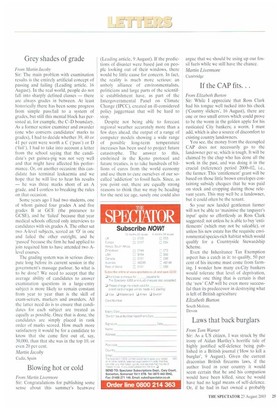Grey shades of grade
From Martin Jacoby Sir: The main problem with examination results is the entirely artificial concept of passing and failing (Leading article, 16 August). In the real world, people do not fall into sharply defined classes — there are always grades in between. At least historically there has been some progress from simple pass/fail to a system of grades, but still this mental block has persisted at, for example, the C–D boundary. As a former senior examiner and awarder (one who converts candidates' marks to grades), I had to decide whether 39, 40 or 41 per cent were worth a C (pass') or D (lair). I had to take into account a letter from the school saying that the candidate's pet guinea-pig was not very well and that might have affected his performance. Or, on another occasion: this candidate has terminal leukaemia and we hope that he will live to hear his results — he was three marks short of an A grade, and I confess to breaking the rules on that occasion.
Some years ago I had two students, one of whom gained four grades A and five grades B at GCE (the precursor to GCSE), and he 'failed' because that year medical schools offered only interviews to candidates with six grades A. The other sat two A-level subjects, scored an '0' in one and failed the other outright, and he 'passed' because the firm he had applied to join required him to have attended two Alevel courses.
The grading system was in serious disrepute lona, before its current session in the government's massage parlour. So what is to be done? We need to accept that the average ability of candidates to answer examination questions in a large-entry subject is more likely to remain constant from year to year than is the skill of exam-setters, markers and awarders. All the latter need do is to ensure that candidates for each subject are treated as equally as possible. Once that is done, the candidates are simply placed in rank order of marks scored, How much more satisfactory it would be for a candidate to know that she came first out of, say, 30,000, than that she was in the top 10, or even 20 per cent.
Martin Jacoby
Cadiz, Spain


























































 Previous page
Previous page